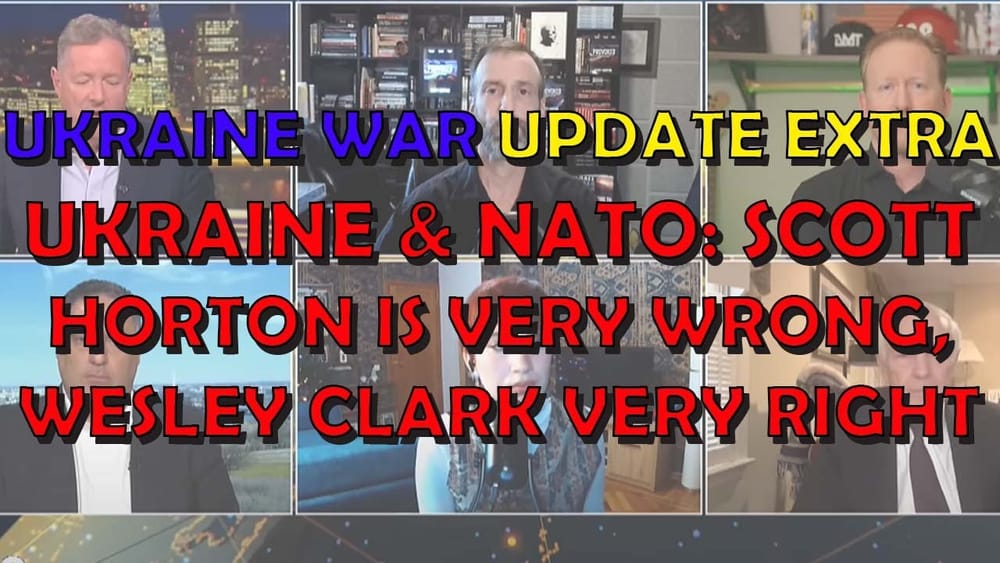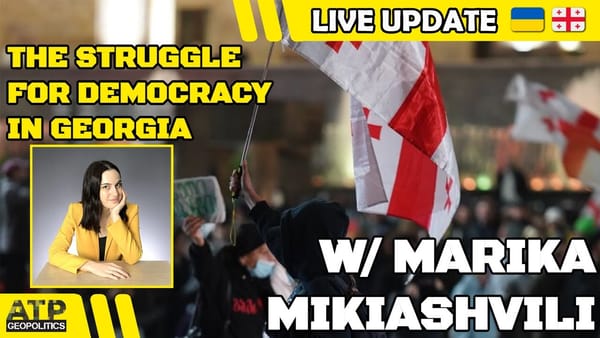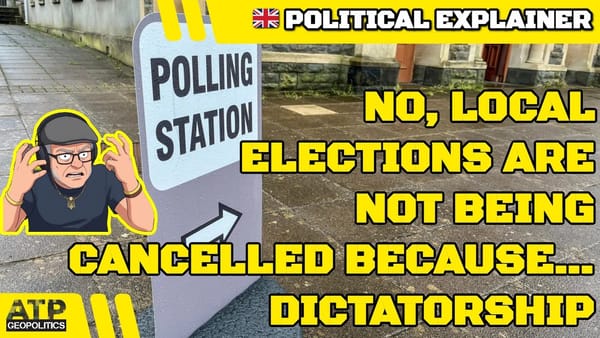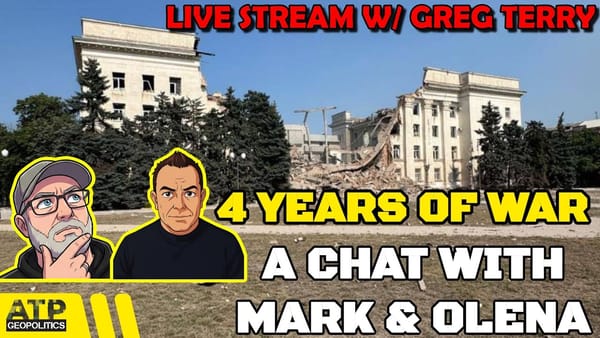Ukraine War Update EXTRA: Ukraine & NATO; Scott Horton Is Very Wrong, Wesley Clark Is Very Right
Table of Contents 📖
"This war is about our very long time, centuries long oppressor, trying to thrust us back under their control."
Hello Team
🎦 00:00-00:29⏩
Jonathan introduces the video as a "Ukraine War News Extra", where he will deep dive into a Piers Morgan panel discussion. He expresses his dislike for Piers Morgan, deeming him a "wingnut", but acknowledges that Morgan understands the situation in Ukraine.
Return to top⤴️
Introduction to Piers Morgan Panel
🎦 00:29-03:21⏩
Jonathan introduces the panellists:
- Scott Horton: A libertarian, conservative, anti-war writer who Jonathan believes is pro-Russia and whose book on the Ukraine war is "deeply problematic".
- Cenk Uygur: From "The Young Turks", he is anti-Putin but subscribes to the "NATO expansionism" argument.
- Anastasia Paraskovova: A Russian-speaking Ukrainian from Kharkiv who Jonathan has interviewed before.
- Rob O'Neill: The former Navy SEAL who killed Osama bin Laden; Jonathan thinks O'Neill leans towards an "America is getting involved all around the world" and "military-industrial complex" viewpoint, aligning with Horton.
Jonathan feels the panel lacks balance, with Anastasia being pro-Ukraine, Cenk somewhat pro-Ukraine but advocating for peace, and Horton and O'Neill seemingly spouting Russian propaganda.
Return to top⤴️
Jonathan's Approach to Analysing the Panel
🎦 03:21-04:03⏩
Jonathan states he will interject with his own commentary while analysing the panel discussion and encourages viewers who want to watch uninterrupted to do so on the original Piers Morgan Uncensored channel. He anticipates getting angry due to some of the opinions expressed and wants to share his thoughts and analysis with his audience.
Return to top⤴️
Scott Horton's Comments: Ukraine's Losses, Trump's Potential Role, and Biden's "Betrayal"
🎦 04:03-07:34⏩
Jonathan plays a clip of Scott Horton suggesting that a potential peace settlement might involve Putin keeping the annexed territories while the remainder of Ukraine comes under NATO protection, doubting Putin would accept Ukraine joining NATO in any form. Jonathan critiques Horton's use of language ("what's left of Ukraine"), indicating Horton's pro-Russian stance. Horton believes the Ukrainians are in no position to reverse Russia's gains and criticises the Biden administration's support for Ukraine. Jonathan strongly disagrees, arguing that Ukraine is in a better military position now than in February 2022, while Russia is on the brink of economic collapse and suffering from heavy attrition. He emphasises the importance of increased Western support for Ukraine at this crucial juncture. Jonathan criticises Horton for overlooking the possibility that the Biden administration's reluctance to provide certain weapons to Ukraine might be why they haven't reclaimed all territory.
Return to top⤴️
ATACMS Missiles and US Restrictions
🎦 07:34-09:56⏩
Jonathan digresses to discuss ATACMS missiles, referencing a conversation with "James from Ukraine". He claims the US withheld ATACMS due to their advanced guidance systems, specifically the M-code encrypted GPS. He believes this technology is crucial and should have been given to Ukraine earlier. Jonathan suggests the US could do more than just provide weapons, such as lifting restrictions, supporting Ukraine's military industry, and sharing more intelligence. He returns to Horton's comments, who predicts Russia will retain the four annexed regions and hopes they won't demand Kharkiv or Odesa. Jonathan refutes this, highlighting Ukraine's significant territorial gains since the war's early stages and the weakened state of the Russian military. Horton suggests Trump would need to frame the situation as Biden's "betrayal", claiming Biden made promises to Ukraine he couldn't keep. Jonathan expresses anger at Horton's narrative, emphasising the dire situation in Ukraine during the war's initial months and the progress made since then. He cites the deterioration of the Russian military as evidence that Ukraine has not "lost anyway", contrary to Horton's assertion.
Return to top⤴️
Scott Horton's Claims: US Involvement in Afghanistan and Ukraine
🎦 09:56-13:38⏩
Horton draws a parallel between the US withdrawal from Afghanistan and the situation in Ukraine, arguing Trump would acknowledge a loss and stop trying, whereas Biden prolongs the conflict. He suggests Biden's handling of the war has been a "tragedy" for Ukraine. Jonathan acknowledges room for criticising Biden's handling of the war but calls out Horton's anti-Biden bias and adherence to "problematic" views like NATO expansionism. He believes Horton's book is driven by an agenda rather than a genuine pursuit of truth.
Return to top⤴️
Further Discussion on ATACMS Restrictions
🎦 13:38-15:08⏩
Jonathan further discusses ATACMS missiles, quoting "James from Ukraine" again about the M-code encrypted GPS system and its importance for navigation and resistance to electronic warfare. He reiterates his belief that Ukraine should have received this technology sooner and that its potential impact on drone warfare is significant. Jonathan returns to the Piers Morgan panel discussion.
Return to top⤴️
Piers Morgan Challenges Scott Horton on "Goading" Russia
🎦 15:08-16:32⏩
Jonathan highlights Piers Morgan acknowledging that several guests, including Horton, have echoed Russian propaganda about the West and Ukraine "goading" Russia into the war. Jonathan observes Horton's typical response of dismissing any criticism as "Russian propaganda" and criticises Horton's susceptibility to Kremlin narratives.
Return to top⤴️
Jonathan's Analogy: Justifying Invasion
🎦 16:32-19:50⏩
Jonathan plays a clip where Piers Morgan acknowledges the potential validity of the "goading" argument but emphasises that it doesn't justify a full-scale invasion. Horton suggests Putin had alternative options, highlighting the title of his book, "Provoked", implies blame on Washington. Jonathan criticizes this stance, accusing Horton of providing Putin with a free pass and labeling him "morally repugnant". He uses an analogy of teasing a thug who then retaliates by killing another person to illustrate that while provocation might exist, it doesn't justify the subsequent violence. Jonathan argues that any actions by NATO or the US don't justify Russia's invasion, war crimes, and civilian killings.
Return to top⤴️
Causality, Scott Horton's Agenda, and Victim Blaming
🎦 19:50-25:16⏩
Jonathan discusses the complexity of causality, referencing JL Mackie's INUS conditions, which describe how insufficient but necessary conditions can collectively contribute to an event. He uses a house fire analogy with multiple contributing factors to illustrate this. Jonathan criticizes Horton for oversimplifying causality and fixating on Washington's role as the "provocation". He believes Horton's book reflects a pre-determined agenda to blame the US government rather than a genuine exploration of the complex factors leading to the war. Jonathan also accuses Horton of engaging in victim blaming by focusing on the actions of the "provoked" party rather than the aggressor's responsibility.
Return to top⤴️
Scott Horton's Claims: Maidan Coup, Crimea Annexation, and Obama/Biden's Role
🎦 25:16-28:01⏩
Jonathan expresses frustration with Horton's continued focus on the US, anticipating Horton will attribute the 2014 Maidan revolution to a US-led coup orchestrated by Barack Obama, claiming Crimea's annexation was a response to the supposed coup. Jonathan anticipates Horton will argue that the new Ukrainian government threatened to abolish the Kharkiv Pact, leading to Russia's actions. He believes this narrative is straight from Russian propaganda and is frustrated by its repetition.
Return to top⤴️
Confronting Scott Horton on Russian Propaganda
🎦 28:01-29:56⏩
Jonathan directly addresses Horton's claims, labeling them "Russian propaganda". He challenges Horton's assertion that his views are not influenced by Russian narratives, arguing that even if Horton arrived at these conclusions independently, they are still circulating in the information space because of Russian propaganda efforts. He suggests Horton's agenda aligns with the Kremlin's anti-US, anti-NATO, anti-hegemony stance, making him susceptible to their narratives. Jonathan asserts that Horton's claims mirror Russian propaganda and accuses him of repeating their talking points, regardless of whether he consciously realizes it. He dismisses Horton's defense of "speaking the truth" as meaningless.
Return to top⤴️
Anastasia's Testimony: Maidan Revolution and Corruption
🎦 29:56-37:04⏩
Jonathan plays a clip of Anastasia directly responding to Horton's claims. She clarifies that the Maidan events were not a coup but a revolution involving millions of Ukrainians, including herself as a 19-year-old. She explains her participation was driven by concerns about corruption and Yanukovych's pro-Russian stance, particularly his refusal to sign a treaty with the EU despite popular support. Anastasia emphasises the desire of many Ukrainians, especially younger generations, to move away from Russian influence and towards democracy and liberty. She describes the revolution as a response to Yanukovych's broken promises, police brutality against protesters, his reliance on Putin's advice for suppressing dissent, and the enactment of dictator laws restricting protests. Anastasia highlights Russia's role in arming Yanukovych and sending soldiers to Crimea under the pretext of protecting Russian speakers.
Return to top⤴️
Jonathan's Analysis: Agency of Ukrainians and Russia's Role
🎦 37:04-39:18⏩
Jonathan praises Anastasia's response and underscores its significance in debunking Horton's narrative. He emphasizes the agency of Ukrainians, arguing that they are not mere tools of the West or Russia. He criticises Horton for overlooking the extensive Russian influence in Ukraine, comparing the number of Russian collaborators and puppet leaders to the few Western figures involved. Jonathan argues that focusing solely on US involvement lets Russia off the hook for its actions and ignores the historical context of Russian interference in Ukraine. He downplays the causal importance of the Western individuals Horton focuses on, claiming they were reacting to the threat Russia posed to Ukraine's sovereignty.
Return to top⤴️
Anastasia's Testimony: Russian Oppression and Ukraine's Choice
🎦 39:18-41:00⏩
Anastasia continues her testimony, pointing out that the war is not about America but about Ukraine's centuries-long struggle against Russian oppression. She highlights similar dynamics in Georgia, where protests erupted against a corrupt, pro-Russian government. Anastasia asserts that joining NATO was not a topic of discussion in Ukraine until after the Russian invasion, emphasising it was never about NATO but about resisting Russian control. She refutes Horton's claims about persecuted Russian speakers and highlights Finland's decision to join NATO as evidence of Russia's threatening behavior.
Return to top⤴️
Rob O'Neill's Comments and Introduction of Wesley Clark
🎦 41:00-41:33⏩
Jonathan briefly mentions that Rob O'Neill, the other panellist, acknowledges learning from Anastasia and Wesley Clark but then launches into an "American empire" argument, which Jonathan chooses not to analyze further. He praises Wesley Clark's upcoming contribution to the discussion as "fantastic" and moves on to that segment.
Return to top⤴️
Wesley Clark's Entry and Initial Comments: Maidan, NATO Expansion, and Putin's Ambition
🎦 41:33-44:16⏩
The panel welcomes General Wesley Clark, former NATO Supreme Allied Commander. Clark shares his personal experience visiting Maidan and talking to Ukrainians, emphasizing the misinformation surrounding the events. He directly contradicts Horton's narrative, stating that NATO didn't expand aggressively but was drawn to Eastern Europe by people seeking freedom from Russian oppression. Clark highlights the fear of Russian resurgence in those countries, explaining their desire for security and investment, which NATO membership provided. He emphasizes that Putin's ambition to restore Russian influence dates back to his presidency in 1999, citing a speech where Putin referred to Ukraine and Russia as "more than brothers". Clark recalls being warned by Poland about Putin's intentions and criticizes the West's perceived weakness for emboldening Putin. He advocates for strong Western support, including providing Ukraine with more aid, NATO membership, and a firm stance against Putin's aggression.
Return to top⤴️
Jonathan's Analysis: Putin's Actions and Wesley Clark's Stance
🎦 44:16-45:29⏩
Jonathan praises Clark's comments, stating he is "speaking on behalf of Ukraine". He reinforces Clark's point about Putin's history of aggression in Chechnya, Georgia, and Ukraine. Jonathan acknowledges past criticisms of US actions, citing Iraq and South America, but asserts that the situation in Ukraine is clear-cut. He believes Clark is "spot on" and draws parallels to the appeasement of Hitler in the 1930s. Jonathan dismisses arguments about corruption in Ukraine, arguing that it's not comparable to Russia's system of organized crime intertwined with government and intelligence agencies.
Return to top⤴️
Wesley Clark's Comments: Trump's Dilemma, Middle East Involvement, and Ukrainian Agency
🎦 45:29-48:01⏩
Wesley Clark acknowledges the potential dilemma facing a potential Trump presidency, suggesting that conceding to Putin's demands would project weakness and embolden China. He predicts Netanyahu will request Trump's involvement in the Middle East, posing a challenge to the Iranian regime. Clark reiterates the Ukrainians' desire for an end to the conflict but emphasizes it was forced upon them. He highlights the importance of recognizing Ukrainian agency and respecting their wishes regarding alignment with the West.
Return to top⤴️
Jonathan's Analysis: Importance of Ukrainian Choice
🎦 48:01-48:44⏩
Jonathan echoes Clark's point about respecting Ukrainian agency, suggesting that asking Ukrainians what they want is paramount. He believes their preference for alignment with the EU, Europe, and potentially NATO is evident. Jonathan argues that the stark contrast in prosperity between Ukraine and Poland, a NATO member, demonstrates the benefits of Western security guarantees.
Return to top⤴️
Wesley Clark's Comments: US Leadership, Trump's Position, and Putin's Threats
🎦 48:44-54:09⏩
Clark believes strong US leadership is crucial for resolving the conflict. He expresses doubt that Trump, despite past claims about ending the war quickly, would concede everything to Putin, as it would damage US credibility and invite further conflict elsewhere. Clark sees the Biden administration's efforts to increase support for Ukraine as a positive step and believes Trump will face similar constraints upon assuming office. He reveals Putin has already threatened Trump, comparing it to a mafia intimidation tactic.
Return to top⤴️
Rob O'Neill's Dislike for Zelensky and Discussion on War's Duration
🎦 54:09-54:52⏩
Jonathan briefly mentions that Rob O'Neill, the former Navy SEAL, expressed dislike for Zelensky, despite his performance during the war, a sentiment Jonathan finds perplexing. He also notes an interesting but time-consuming discussion between Cenk Uygur and Wesley Clark about the war's potential duration, which he opts to skip for the sake of time.
Return to top⤴️
Scott Horton's Criticism of Biden and Wesley Clark
🎦 54:52-56:05⏩
Jonathan plays a clip of Horton claiming Biden hasn't been forceful enough in his rhetoric towards Russia. He criticizes Biden for not adopting a more "bellicose" and "Trumpian" approach. When Piers Morgan brings in Horton to respond to Clark's comparison of him to Hitler appeasers, Horton dismisses it as "preposterous" and accuses Clark of resorting to ad hominem attacks because he has run out of arguments.
Return to top⤴️
Jonathan's Analysis: Wesley Clark's Arguments and Scott Horton's Response
🎦 56:05-57:56⏩
Jonathan defends Wesley Clark, asserting that he presented strong arguments based on his personal experience and knowledge. He criticizes Horton's dismissive response as "pathetic" and highlights Horton's tendency to label any dissenting view as "Russian talking points". Jonathan challenges Horton's claim of writing a 775,000-word book filled with insights from American "graybeards" by pointing out that Horton lacks firsthand experience and relies heavily on his agenda-driven interpretation.
Return to top⤴️
Scott Horton's Question to Wesley Clark: NATO Expansion vs. Partnership for Peace
🎦 57:56-01:01:12⏩
Horton poses a question to Clark, referencing a debate in the 1990s about NATO expansion versus a "Partnership for Peace" approach involving Russia. He suggests Clark, along with William Perry and John Shalikashvili, advocated for the partnership, prioritizing a stable relationship with Russia. Horton argues that Richard Holbrooke and others overrode the Pentagon's preference, leading to NATO expansion and a redrawing of dividing lines in Europe. Jonathan criticizes Horton's argument, asserting that those Eastern European countries actively sought NATO membership for their own security, making NATO stronger and promoting democratic development in those nations. He challenges Horton's emphasis on maintaining good relations with Russia, arguing that Putin's ambitions are incompatible with peaceful coexistence.
Return to top⤴️
Wesley Clark's Response: Early Hopes for Russian Reform, Eastern European Aspirations, and NATO-Russia Council
🎦 01:01:12-01:05:24⏩
Clark acknowledges the multiplicity of interests with Russia in the early 1990s, particularly regarding nuclear weapons control. He explains the US's efforts to secure loose nukes and assure Ukraine that its borders would be respected after giving up its nuclear arsenal. Clark highlights the desire for independence among Ukrainians, emphasizing their distinct culture and history separate from Russia. He notes early hopes for democratic reform in Russia but acknowledges their failure to materialize. Clark recalls Eastern European leaders pleading for NATO protection during Clinton's visits, recognizing the need for security against Russian threats. He explains that initial efforts focused on engaging Russia and encouraging reform through integration but that those hopes proved misplaced.
Return to top⤴️
Jonathan's Analysis: Shifting Perspectives on Russia and Wesley Clark's Experience
🎦 01:05:24-01:06:53⏩
Jonathan connects Clark's explanation to the concept of "reform through assimilation", where integrating Russia into Western structures was expected to foster democratic development. He acknowledges the eventual realization that this approach was ineffective due to Putin's nature. Jonathan contrasts Horton's armchair analysis with Clark's firsthand experience, emphasizing Clark's direct interactions with Russian and Eastern European leaders who revealed their contrasting views on NATO membership. He criticizes Horton's agenda-driven interpretation and cherry-picking of data points, highlighting Clark's credibility as someone who witnessed the events firsthand.
Return to top⤴️
Wesley Clark's Testimony: NATO Enlargement and Russian Concerns
🎦 01:06:53-01:07:51⏩
Clark clarifies that the decision to enlarge NATO was driven by the aspirations of Eastern European countries, not by aggressive US expansionism. He recalls an anecdote involving Russian Foreign Minister Yevgeny Primakov, who acknowledged Russia's lack of permanent friends and focus on self-interest. Clark interprets this as a signal of Russia's unwillingness to cooperate with NATO and its intention to pursue its own path. He highlights the billions of dollars invested in Russia during the 1990s to support democratic and economic development, but emphasizes that these efforts were ultimately undermined by Putin's consolidation of power and suppression of dissent.
Return to top⤴️
Jonathan's Analysis: Contrasting Approaches and Understanding Ukrainian Perspectives
🎦 01:07:51-01:09:39⏩
Jonathan points out the difference in perspectives between Horton, who relies on research and interpretation, and Clark, who participated in these events directly. He criticizes Horton's lack of firsthand experience and knowledge of Russian language and culture, highlighting Clark's deeper understanding based on his direct interactions with Russian officials and his awareness of their intentions. Jonathan reiterates the importance of recognizing Ukrainian agency and understanding their desire for alignment with the West rather than Russia.
Return to top⤴️
Wesley Clark's Final Comments: Russian Perception of Threat, Importance of NATO Protection, and Potential for Cooperation
🎦 01:09:39-01:13:26⏩
Clark recalls an exchange with a Russian minister about the perceived threat of a single NATO division near Belarus, emphasizing the absurdity of Russia's security concerns. He stresses the importance of NATO membership for Eastern European countries, citing the stark economic disparity between Poland, a NATO member, and Ukraine. Clark believes the current situation presents a crucial choice between upholding the rule of law and reverting to 19th-century imperial competition. He concludes by expressing hope for a peaceful resolution but emphasizes the need for Western resolve in standing up to Putin.
Return to top⤴️
Jonathan's Final Analysis: Wesley Clark's Expertise and Anastasia's Testimony
🎦 01:13:26-01:16:49⏩
Jonathan commends Clark for effectively addressing Horton's attempt to discredit him with a "gotcha" question about William Perry's regret over NATO expansion. He praises Clark's nuanced explanation, personal experience, and contextualization of the events. Jonathan emphasizes the combined impact of Clark's expertise and Anastasia's firsthand testimony in dismantling Horton's arguments. He reiterates his belief in the importance of Ukrainian agency and their desire for a future aligned with the West. Jonathan advocates strongly for Ukraine's NATO membership and criticizes those who oppose it. He considers the prevention of another Russian invasion paramount.
Return to top⤴️
Wrap up
🎦 01:16:49-01:17:02⏩
Jonathan concludes the video, encouraging viewers to share their thoughts, subscribe to the channel, like and share the video, and thanks them for watching. He mentions his upcoming "actual geopolitics" video.
Return to top⤴️




